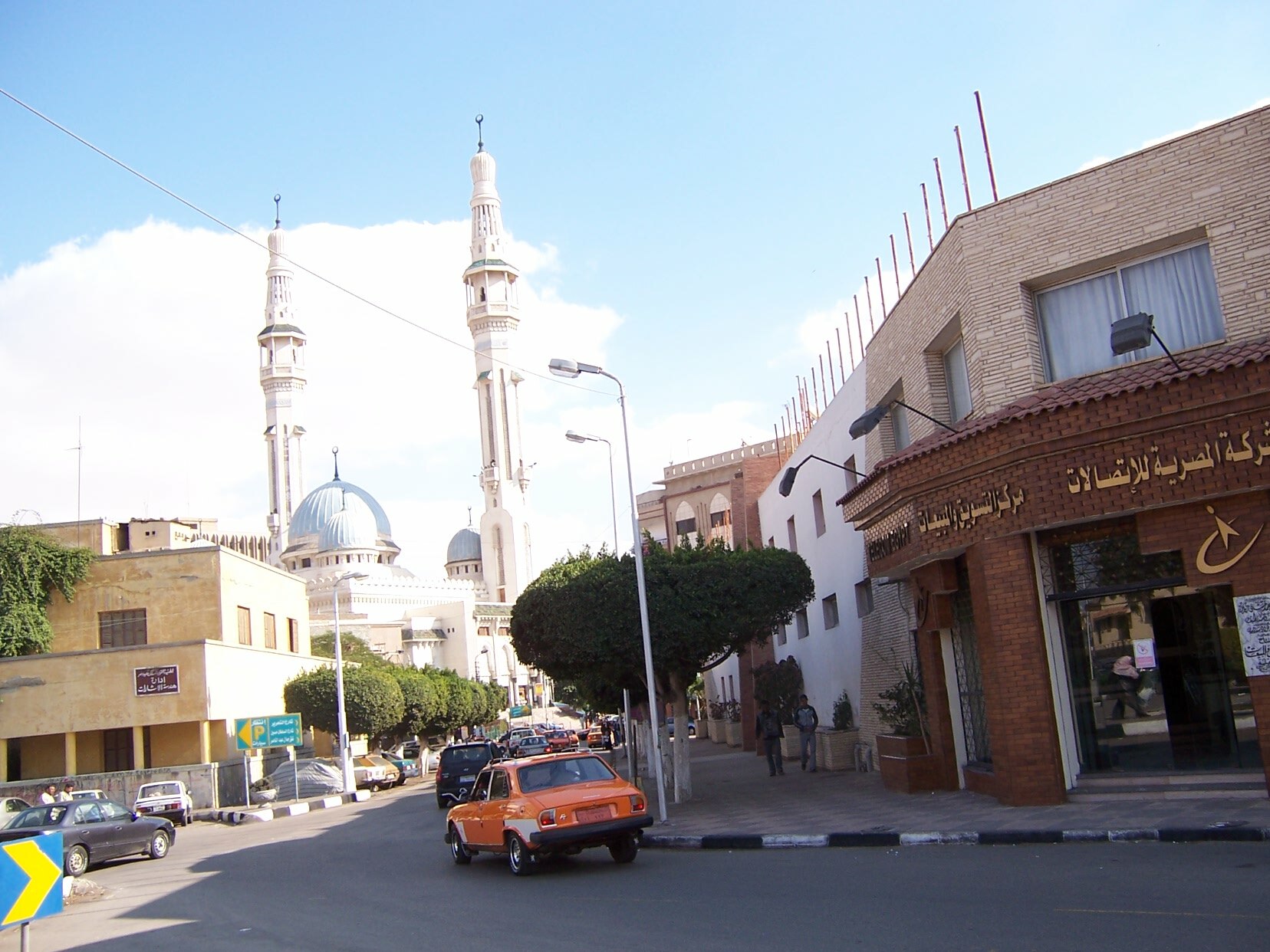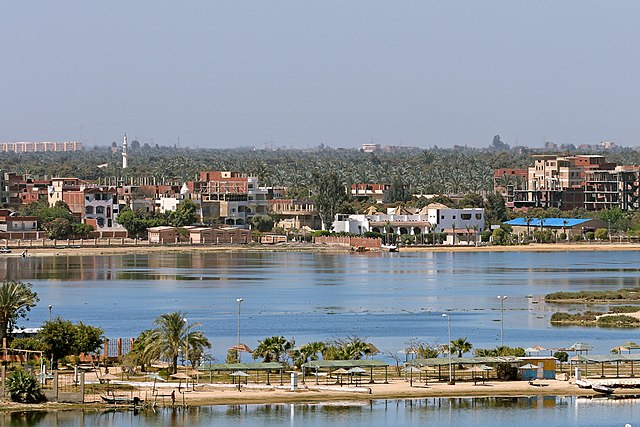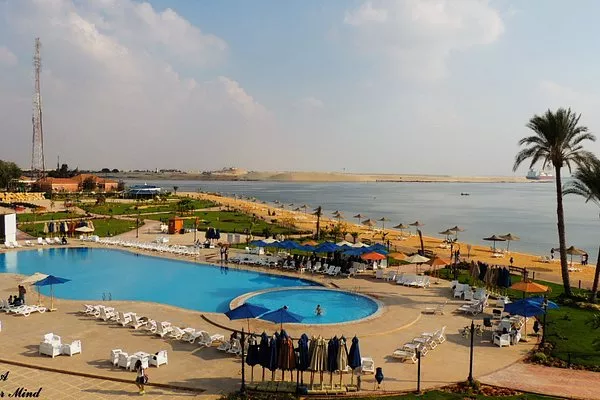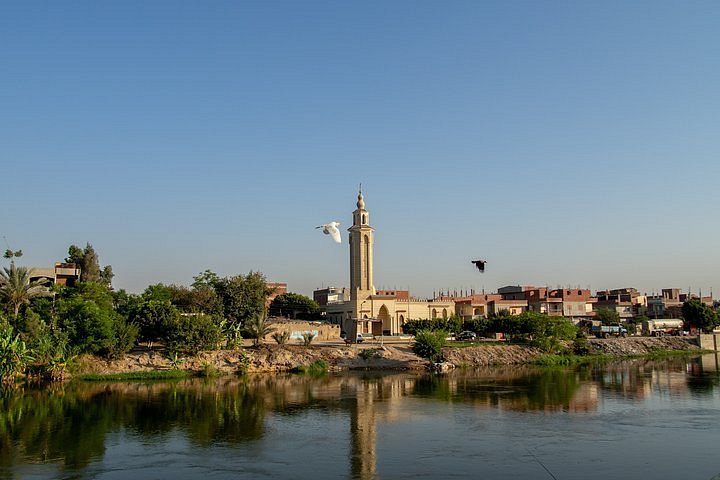Ismailia is a city in northeastern Egypt, located on the west bank of the Suez Canal. It was founded in 1863 during the construction of the canal and is named after Ismail Pasha, the then Khedive of Egypt. Known as the “City of Beauty and Enchantment,” Ismailia has a unique charm with its tree-lined streets, colonial architecture, and proximity to the canal.
The city is a crucial center for shipping and maritime activity due to its strategic location on the Suez Canal, connecting the Mediterranean Sea with the Red Sea. It also has a rich history related to the canal’s construction and is home to the Suez Canal Authority’s headquarters.
Ismailia’s mild climate, beautiful gardens, and access to Lake Timsah make it a popular destination for locals and tourists alike. Additionally, it hosts the Ismailia International Film Festival for Documentaries and Shorts, enhancing its cultural significance.
Table of Contents
ToggleThe History of Ismailia
Ismailia’s history is closely tied to the construction of the Suez Canal, one of the most significant engineering feats of the 19th century. The city was founded in 1863 by Khedive Ismail Pasha, the ruler of Egypt, to serve as a base for the workers and engineers involved in the canal’s construction. Its name honors Ismail Pasha, reflecting the importance of his reign in Egypt’s modernization and infrastructure development.
The Suez Canal project, overseen by the French engineer Ferdinand de Lesseps, began in 1859 and concluded in 1869, significantly transforming global trade routes by providing a direct link between the Mediterranean and the Red Sea. Ismailia was a pivotal logistical hub for the workforce and materials needed to complete the canal.
During its early years, Ismailia was developed as a modern city with European-inspired architecture and wide, tree-lined streets. The city’s strategic location along the canal attracted foreign residents, including engineers and diplomats, giving it a cosmopolitan character. Many colonial-style buildings from this period still stand today.
In the mid-20th century, Ismailia became a focal point during major political events, particularly the Suez Crisis 1956. This event, triggered by Egypt’s nationalization of the Suez Canal, led to a military conflict involving Egypt, Israel, France, and the United Kingdom. This confrontation directly affected Ismailia, as it lies at the heart of the canal zone. The city also witnessed significant military action during the 1973 October War (Yom Kippur War), when Egypt launched an operation to reclaim the Sinai Peninsula from Israeli occupation.
Despite these turbulent events, Ismailia has since returned to its role as a peaceful city known for its gardens, relaxed atmosphere, and status as a hub of maritime activity along the Suez Canal. It continues to be the headquarters of the Suez Canal Authority and serves as a historical and cultural landmark of Egypt’s modern development.
The Inhabitants of Ismailia
The inhabitants of Ismailia, known as Ismailians, are a diverse and dynamic community shaped by the city’s unique history and geographical significance. The city’s population reflects a blend of local Egyptians and people from various parts of the country who moved to Ismailia for work, particularly during and after the construction of the Suez Canal. Over time, the population has become more settled, and Ismailia has developed a distinct identity reflecting its Egyptian roots and international influences.
Ethnic and Social Composition:
Most of Ismailia’s inhabitants are Egyptian, with various backgrounds, including those of Bedouin, Fellahin (rural farmers), and urban origins. The city has also historically had a foreign presence, especially during the colonial era when French and British engineers, workers, and diplomats lived in the city. While the foreign population has decreased significantly, Ismailia’s cosmopolitan past still influences the culture, as seen in some architectural styles and the city’s openness to cultural exchanges.
Cultural Identity:
Ismailians are known for their warm hospitality, and the city has a more laid-back and community-oriented atmosphere than larger Egyptian cities like Cairo or Alexandria. The canal plays a major role in daily life, as many of the city’s inhabitants are involved in maritime industries, shipping, and related services. Others work in agriculture, as Ismailia’s fertile lands, particularly around the Sweet Water Canal and Lake Timsah, make it an important regional agricultural hub.
Language and Religion:
Arabic is the dominant language spoken in Ismailia, with the Egyptian Arabic dialect being the most common. The population is predominantly Muslim, reflecting Egypt’s overall religious demographics, with the majority being Sunni Muslims. There is also a small Christian community, mainly belonging to the Coptic Orthodox Church, which plays a visible role in religious and social life.
Ismailia’sIsmailia’s Heritage
A City of Youth and Innovation
Ismailia is home to many young people, partly because universities such as the Suez Canal University attract students from all over Egypt. This gives the city a youthful energy and contributes to its growing reputation as a place for technological and cultural innovation. Festivals, particularly the Ismailia International Film Festival, further engage the local youth and draw international attention.
In short, Ismailia’s inhabitants are a diverse mix of people proud of their city’s historical significance and crucial role in Egypt’s economy. The Suez Canal, agriculture, and a tradition of openness to local and international cultures shape their lifestyle.
Tourist Attractions
Ismailia, known as the “City of Beauty and Enchantment,” offers a mix of historical, natural, and cultural attractions reflecting its unique location along the Suez Canal and rich history. Here are some of the key tourist attractions in Ismailia:
Lake Timsah (Crocodile Lake)
One of the most scenic spots in Ismailia, Lake Timsah, is a natural saltwater lake located directly on the Suez Canal. The lake is popular for its beautiful views, water sports, and recreational activities like swimming and sailing. Its sandy beaches make it a favorite getaway for locals and visitors, offering a relaxed atmosphere with picnic spots and waterfront cafés.
The Suez Canal
The Suez Canal itself is a major attraction in Ismailia. Visitors can watch large ships and international vessels passing through the canal, one of the busiest waterways in the world. The sight of these ships navigating the narrow canal is particularly fascinating and draws maritime enthusiasts from around the globe. Viewing platforms along the canal provide perfect spots for observing the ships up close.
Ismailia Museum
This museum, established in 1932, offers a fascinating collection of artifacts that highlight Egypt’s rich history. Items range from the Pharaonic, Greco-Roman, Coptic, and Islamic periods. The museum houses ancient statues, pottery, jewelry, and other historical objects, offering insight into Egypt’s long and diverse cultural heritage. It is one of the oldest museums in Egypt, and though small, it is rich in important archaeological pieces.
The Temples of Tell el-Maskhuta
Located about 15 kilometers from Ismailia, Tell el-Maskhuta is an ancient archaeological site dating back to the Pharaonic period. The area contains remnants of temples and ruins that are believed to have been part of the ancient city of Pithom, as mentioned in Biblical texts. It is one of the most important archaeological sites in the region for history enthusiasts, offering a glimpse into Egypt’s ancient past.
Ferdinand de Lesseps’ House
This historical building was the residence of Ferdinand de Lesseps, the French engineer who oversaw the construction of the Suez Canal. Located along the canal, the house reminds visitors of the international efforts involved and Ismailia’s role in this global project. Though the house is not always open to the public, its exterior is a popular stop for tourists interested in the canal’s history.
Ismailia International Film Festival
This prestigious film festival is held annually and is dedicated to documentaries and short films. It attracts filmmakers, critics, and cinema lovers from around the world. While it’s not a traditional ” tourist attraction,” attending the festival offers a cultural experience that sets Ismailia apart as a center for artistic innovation in Egypt.
Sweet Water Canal
The Sweet Water Canal was constructed to supply fresh water to workers during the building of the Suez Canal and is still a key feature of the region. It runs parallel to the Suez Canal, and its banks are lined with lush greenery, making it a peaceful spot for walks, boat rides, and enjoying the area’s natural beauty.
Tennis Island (Geziret Al-Tennis)
Located in Lake Manzala, near Ismailia, Tennis Island is famous for its ancient ruins dating back to the Roman and Islamic eras. The island was historically important for trade and craftsmanship during medieval times. Visitors can explore the ruins and enjoy the natural beauty of the surrounding lake, making it a unique day trip from the city.
- Garden of the Obelisk
This peaceful garden is home to an ancient obelisk that dates back to the 12th Dynasty of ancient Egypt. The garden offers a quiet space for visitors to relax, with views of the obelisk and its historical significance. The site also provides a tranquil setting for walking and enjoying the greenery.
French War Memorial
This memorial, located near the Suez Canal, honors French soldiers who died during World War I. It’s a solemn and historical site offering insight into the region’s role in significant global conflicts. The memorial is a reminder of IsmailiIsmailia’s historical history and its involvement in world events.
Temples of Ancient Bubastis (Tell Basta)
About an hour’s drive from Ismailia is the ancient site of Bubastis (modern-day Zagazig). This area was once home to the Temple of Bastet, the cat goddess, and was an important religious center in ancient Egypt. While much of the temple is in ruins, it remains a significant archaeological and historical site, attracting those interested in Egyptology.
Fishing and Water Sports
Given Ismailia’sIsmailia’s proximity to lakes and the Suez Canal, it is a prime destination for fishing enthusiasts. Visitors can enjoy freshwater fishing in the local lakes or participate in water sports like windsurfing, boating, and swimming, particularly around Lake Timsah.
In summary, Ismailia has a rich blend of historical, natural, and cultural attractions. Whether exploring ancient ruins, relaxing by the lakes, or watching the ships navigate the canal, Ismailia offers a unique and serene experience for tourists looking to explore Egypt’s past and natural beauty.
Frequently Asked Questions
Where is Ismailia City located?
Ismailia is located in northeastern Egypt, along the western bank of the Suez Canal. The city sits approximately halfway between Cairo (about 125 kilometers to the west) and Port Said (about 80 kilometers north), making it a central point on the Suez Canal. Ismailia is also close to the Sinai Peninsula, with the Suez Canal as a natural border between mainland Egypt and Sinai.
Geographically, Ismailia is situated near Lake Timsah, part of the canal system, surrounded by fertile agricultural lands and waterways like the Sweet Water Canal. Its strategic location along the canal has made it an important center for maritime and shipping activities.
What are the top must-visit in Ismailia?
One of the most captivating experiences in Ismailia is relaxing by Lake Timsah, a picturesque lake with sandy beaches where you can enjoy views of ships passing through the Suez Canal. The canal itself is a must-see, as it provides a unique opportunity to watch large vessels worldwide navigate this crucial waterway. The Ismailia Museum is another essential stop, offering a glimpse into Egypt’s ancient history with its fascinating collection of artifacts from different eras.
With its lush surroundings, the Sweet Water Canal provides a peaceful escape perfect for walks or boat rides. If you’re visiting at the right time, the Ismailia International Film Festival is a cultural highlight, showcasing global documentaries and short films. The French War Memorial also offers a reflective space commemorating soldiers who served in World War I.
Why is it called “Ismailia”?
Ismailia is named after Khedive Ismail Pasha, who was the ruler of Egypt when the city was founded in 1863. Ismail Pasha played a significant role in modernizing Egypt and was a key figure in the construction of the Suez Canal, which began under his reign. The city was established as a base for the canal’s construction workers and engineers, and naming it after Khedive Ismail honored his leadership and vision for transforming Egypt into a more modern, globalized nation.
The name “Ismailia” reflects the importance of Ismail Pasha’s contribution to the canal project and Egypt’s broader efforts at modernization during the 19th century.
